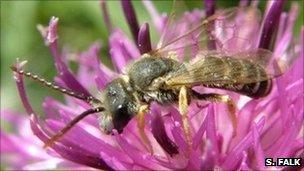Sussex South Downs is home to 'extinct' bee species
- Published

The Halictus eurygnathus has been recorded on the South Downs for the first time in 65 years
A species of bee which was believed to be extinct in Britain has been found in East Sussex - 65 years after it was last seen.
A study by entomologist Steven Falk shows the solitary bee, Halictus eurygnathus, is at at seven sites on the South Downs.
Mr Falk said many of the species he recorded were rare and some were doing better than expected.
However, others, including one of Britain's largest mining bees, were at risk of losing their habitats.
The study recorded 227 bee and wasp species during more than 100 visits to 15 chalk grassland and chalky heath sites.
The Halictus eurygnathus bee, not seen in Britain since 1946, was found to forage primarily on one type of plant.
Mr Falk said: "I discovered that the main requirement of the bee is an abundance of greater knapweed, which is one of the special flowers of chalk grassland.
"This knowledge should be helpful for the conservation of this species."
Habitat loss
Only two recordings of the Andrena hattorfiana, one of Britain's largest mining bees, were made in the study.
This bee is believed to be vulnerable to habitat loss because it forages exclusively on scabious plants, the prevalence of which has decreased on the South Downs due to grazing.
Andrena hattorfiana's habitat has been reduced by grazing on the South Downs
Mr Falk's report highlights the importance of having wildflower margins in arable fields and blackthorn for bee populations.
Duncan Sivell, from the charity Buglife, said: "This report provides a wealth of information on bees and wasps on the South Downs; species that were thought extinct have been rediscovered, declines in other species have been identified and new behavioural patterns have been recorded.
"These results highlight the importance of survey work, which is badly under-funded."
- Published26 August 2011
- Published4 September 2011